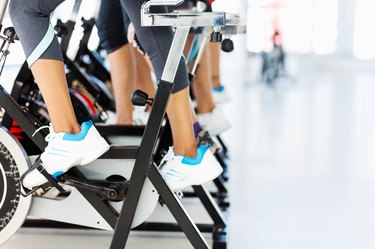
If you're having your wisdom teeth taken out, understanding the postoperative phase can help you make a full recovery. For instance, knowing when you can resume exercise after wisdom teeth removal can minimize the risk of bleeding and other complications.
Like any surgery, removal of a wisdom tooth (also known as a third molar) poses post-surgery risks. After you have a tooth removed, a blood clot forms over the socket — the space that held the tooth.
Video of the Day
Video of the Day
If this clot gets dislodged, it can lead to a painful complication called a dry socket, where your bone and nerves are exposed, according to the Mayo Clinic. This condition can also open the door for further issues, like infection or delayed healing.
Physical activity can potentially oust the blood clot and contribute to dry socket formation, per the Mayo Clinic. As a result, there are some restrictions about when you can exercise after wisdom teeth removal.
To help you have the most effective recovery possible, here's everything you need to know about post-surgery exercise, including how long after wisdom teeth removal you can work out and when to re-introduce different types of activity.
Tip
In general, you can't work out directly after wisdom teeth removal — instead, you should slowly resume exercise over the course of a few days. Our best advice: Follow your surgeon's personalized instructions for when you can work out after wisdom teeth removal, as healing and recovery time may vary from person to person, per the Mayo Clinic.
The Day of Surgery
The best way to prevent a dry socket? Instead of working out after wisdom teeth removal surgery, just rest, according to the Mayo Clinic. Sports and exercise can dislodge that crucial blood clot, which is why your doctor will probably tell you that you can't work out after getting your wisdom teeth removed.
This restriction likely won't be a problem the day of your surgery, as you might feel groggy from the surgery sedative and may have swelling, pain and discomfort from your procedure, according to the Cleveland Clinic. You might also be taking painkillers that make it unsafe to do normal activities like driving, let alone exercising.
What's more, you may not be able to eat as much as usual due to post-surgery discomfort, and thus lack the energy to exercise.
That's why soft snacks like yogurt and applesauce are among the best foods to eat after wisdom tooth removal, per the Cleveland Clinic. As a bonus, yogurt is rich in probiotics that can help fortify your gut while you're taking post-surgery antibiotics.
The takeaway: The best thing you can do for your body is rest and recover. So even if you feel ready to exercise after wisdom teeth removal, avoid any activity the day of the procedure to give yourself time to recuperate and to minimize the risk of complications, per the Mayo Clinic.
Can You Go for a Walk After Wisdom Teeth Removal?
Light walking after wisdom teeth removal is usually OK (think: walking out to the car for your ride home or around your house to go to the bathroom and prepare food).
But more vigorous walking — like going on a hike — should be avoided for at least a few days (and possibly longer, depending on your doctor's instructions) to reduce your risk for complications like dry socket, per the Cleveland Clinic.
2 or 3 Days After Surgery
If your recovery is going smoothly and you're not experiencing any complications, you may be able to add light, low-impact exercises back into your repertoire, like walking, according to the Cleveland Clinic.
That said, it's important to limit strenuous exercise during the several days after wisdom teeth removal to avoid dislodging the blood clot and potentially forming a dry socket, per the Cleveland Clinic.
Translation: Avoid any moderate or vigorous forms of activity like running, high-intensity interval training or boxing, for example.
This also includes heavy lifting, whether that's at your job or during a strength training session, according to the Cleveland Clinic. Exerting yourself in this way can increase blood pressure and bleeding risk. So if you're wondering when you can lift weights after wisdom teeth removal, now is not the time.
You may also still be taking pain medication and avoiding certain foods after wisdom tooth removal, both of which may contribute to weakness or fatigue. Consequently, getting as much rest as possible for the first few days after surgery is what's best for your recovery — not squeezing in a workout, per the Cleveland Clinic.
And if your surgery was complex or bones were cut to remove your teeth, you may need to restrict sports and exercise for a longer time period, according to the Mayo Clinic. Check with your surgeon for individual guidance.
Warning
If you experience a fever over 101 degrees Fahrenheit; pain that increases after three days and is not improved by medication; red, hard swelling; facial numbness; bleeding that won't stop or pus draining from the surgery site, call your surgeon, per the Cleveland Clinic.
About 4 Days After Surgery
Here's how long until you can work out normally after wisdom teeth removal: About four days (assuming your surgery was straightforward and the recovery is smooth), per the Cleveland Clinic.
However, if your typical exercise routine involves contact sports (like football or rugby), it's best to stay on the sidelines until the surgical site has fully healed to avoid reopening the wound.
And if you're still experiencing post-surgery symptoms like swelling or bleeding or if you're still taking pain medication or not eating normally, hold off on activity to give your body more time to heal.
Your best bet: Talk to your doctor before resuming exercise after wisdom teeth removal to make sure it's safe for you, according to the Mayo Clinic.
If you do get the all-clear to work out, it's also important to listen to your body. If you feel dizzy or lightheaded while exercising, stop and wait a few more days before trying physical activity.
Was this article helpful?
150 Characters Max
0/150
Thank you for sharing!
Thank you for your feedback!
Is this an emergency? If you are experiencing serious medical symptoms, please see the National Library of Medicine’s list of signs you need emergency medical attention or call 911.



